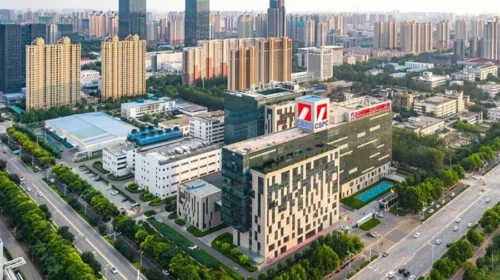Hengrui Pharma accelerates bid for global brand status

The Chinese drugmaker has outlined plans for a secondary listing in Hong Kong to raise its international profile and bolster its overseas ambitions
Key Takeaways:
- Hengrui Pharmaceuticals started out producing generic drugs, but China’s centralized procurement policies took a bite out of its business
- Innovative drugs now make up half of the company’s income and have helped to return earnings to a growth track
By Molly Wen
It has been an open secret for nearly two months that a top Chinese drugmaker was planning to raise fresh capital to boost its international profile.
Now Jiangsu Hengrui Pharmaceuticals Co. Ltd. (600276.SH) has confirmed the rumored plan to list its shares on the main board of the Hong Kong Stock Exchange, adding to its presence on the mainland equity market.
In a statement last week to the Shanghai Stock Exchange, the company said the proposed Hong Kong listing reflected its strategy to innovate and grow its overseas business, with proceeds to be spent on R&D and the commercial launch of products. The secondary listing would not exceed 10% of its equity, the company said, without disclosing any further details about the H-share plan.
The announcement hardly came as a surprise to the market. Back in October, Bloomberg reported that the company was considering raising around $2 billion (14.6 billion yuan) with a Hong Kong listing, citing sources familiar with the plan.
But still, the news did not go down well with investors. On the next trading day, Hengrui’s stock fell 2.53% on the Shanghai market, and the price sank another 5.65% over the next four sessions.
Investors are worried that the extra shares in circulation will dilute the value of their holdings, with a knock-on effect on other companies in China’s pharmaceutical sector.
Hengrui’s price-to-earnings (P/E) ratio stands at an elevated 55 times compared to 16 times, 10 times and 14 times for Shanghai Fosun Pharmaceutical (600196.SH; 2196.HK), CSPC Pharmaceutical (1093.HK) and Sino Biopharmaceutical (1177.HK), three Hong Kong-listed peers with annual revenue exceeding 20 billion yuan. The fear is that Hengrui’s valuation could suffer once its shares are listed in both Shanghai and Hong Kong.
Founded in 1970, the company floated on the Shanghai Stock Exchange in 2000 and went on to build a market value close to 300 billion yuan. As a leading force in China’s drugs industry, it has always spent heavily on R&D compared to its peers. The company’s R&D expenses rose 22% to 4.55 billion yuan in the first three quarters of 2024 from the same period a year earlier.
The investment in innovation has pushed the company up the global rankings. It was the only Chinese company to feature in a global pharmaceutical Top 10 compiled by the intelligence firm Citeline this year, based on drug pipeline size. Hengrui ranked eighth on the list, alongside multinationals such as Roche, Pfizer, AstraZeneca and Eli Lilly.
The company began as a maker of generic drugs but China’s switch to centralized drug procurement for its medical insurance scheme in 2018 dealt the business a heavy blow, as suppliers slashed prices to get products into the approved catalog. Hengrui’s earnings momentum stalled, as revenues dropped 6.59% in 2021 and 17.87% in 2022 on a year-on-year basis.
However, from 2008 the company had begun to transition to innovative drugs, which now account for half of its business and have helped to power an earnings recovery.
The company has 17 drugs on the market that are categorized as novel treatments using new compounds, as well as four self-developed products classified as modified drugs. In the first half of this year, earnings from innovative drugs rose 33% to 6.61 billion yuan, accounting for 49% of total revenue. For the first nine months of 2024, revenue rose 18.67% to 20.19 billion yuan from the year-earlier period, with profit jumping nearly 33% to 4.62 billion yuan.
Big overseas bet
Unlike many companies in the biomedical industry, Hengrui Pharmaceutical is not short of cash. With 22.1 billion yuan in cash assets at the end of the third quarter, the company does not need to court investors to plug any financial hole. Instead, it is looking to use the Hong Kong listing to raise its profile with international investors and publicize its brand outside of China.
A report from CITIC Securities said a Hong Kong listing would help Hengrui develop and promote its products overseas, as well as foster business cooperation. In short, the Hong Kong listing should help the company move further onto the global stage as a multinational pharmaceutical brand.
International business has been a focus this year. In May, the company sold overseas rights to its GLP-1 anti-obesity drugs to the U.S. company Hercules, in exchange for 19.9% of Hercules shares and $110 million in upfront and milestone payments. The transaction could be worth up to $6 billion to the Chinese company, with a revenue-sharing deal and other benefits flowing from the partnership.
The Chinese company has also brought more international expertise into its management team to drive the overseas expansion. Jens Bitsch-Norhave, a former innovation leader at Johnson & Johnson (JNJ.US), was hired as Hengrui’s global head of corporate development in October.
Although its investment has been bearing fruit, Hengrui faces many challenges in China’s busy market for novel drugs. Chairman Sun Piaoyang has highlighted a tendency for companies to crowd into the same parts of the drug business, as well as issues around IP protection and China’s medical insurance scheme.
This might explain why the drugmaker is stepping up its push to penetrate international markets, where clinical and commercial challenges also abound. The coordinates have been set, but it remains to be seen whether Hengrui can plot a smooth course on its international journey.
To subscribe to Bamboo Works weekly free newsletter, click here






